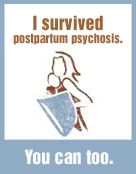Back when I was first diagnosed my dad had what turned out to be a genius idea: to journal about my illness. Every day he wanted me to write down four things: the date, how I was feeling, what meds I took that day, and any side effects I was experiencing. He was determined to figure out what the heck was happening to his little girl, and this little idea was one of the only things he could get me to do which in the end would help in more ways than we knew when I started.
After my most recent hospitalization (which was right after we found out I was pregnant with our second child) I had a very hard time bouncing back. It is true that I respond very well to Lithium, but at the time I was adamant about not going back onto Lithium until I was past the first trimester because of the risk of Ebstein’s anomaly. In reality, my risk was only about 6% if I had used the Lithium during the first trimester, but I refused. And I am very stubborn. And determined. And I got my way.
But looking back I wish I would have just used the medication which I so desperately need flowing through my bloodstream each and every day. Lithium to me is like insulin is to a diabetic. I know this now.
So instead of using Lithium during the first trimester, my psychiatrist agreed to use Haldol to treat my mania. It is the drug that they inject into my backside when I am hospitalized because I reject all oral medications when I am manic. Lucky me. They would have to use three people to hold me down while the fourth administered the drug. It would start working within fifteen minutes – by that point I’d have been walked back to my room and tucked into bed to sleep and let it work its magic. Once I was discharged from the hospital, I had my oral prescription for Haldol filled and continued on it for a few weeks.
Those weeks were such a huge struggle for me. Mentally I felt as though I could not put my thoughts together in sentences. Simply speaking a basic sentence was so incredibly difficult. I barely went out in public for three weeks because I was so afraid of not being able to hold a basic conversation.
I also had a very hard time writing. I found it hard to journal then, mainly because it was so hard to think let alone use a pen to write down those thoughts on paper. My family blog which was normally filled with descriptive paragraphs of what I had been doing with our son each day, were now filled with just little video clips and some pictures here and there. I felt paralyzed to an extent. It was almost as if I could feel the neurons straining so fiercely to fire off some kind of signal. But the neurons were back-firing. Badly.
The chemicals in my brain were so completely off and I wanted more than anything else to just turn them back on.
My dad had another brilliant idea during this difficult time. He told me one morning when we were talking, to make a list of 10 things I wanted to accomplish that day. They could be as simple as unload the dishwasher, make the bed, fold the laundry, or bake cookies with my little man. This way, I could look back on my day and see all the things I was able to get done. This simple method of goal-setting worked like a charm for me.
I still use this tactic to this day. I love to sit down in the morning and jot down the things that I want to accomplish that day. The weeks that I do it, I feel like I get so much more done around the house. For my family and myself. It’s such a great thing to build into your daily routine.
Around week 10 of my pregnancy, fed up from the daily struggle with my malfunctioning brain, I decided to do something about it. I distinctly remember the day I called my high-risk OB-GYN to ask him if I could just go back on the Lithium right then, instead of waiting until the end of week 13. I was pretty much in tears on the phone and he said that I needed to do what was right for me. And that it seemed like I needed it. It being the Lithium. I said yes, and felt an enormous weight lifted off my shoulders when I hung up the phone.
After about a week back on Lithium I began feeling like myself again.
It was a well-calculated risk and one that I was glad that I took. Having to choose between taking a medication while pregnant or struggling with a mental illness that causes you physical stress and trauma is one that I wish no woman would have to make. But sometimes we have to make hard decisions. I was very scared and felt an enormous amount of guilt for having to subject my unborn child to a potentially harmful substance while she was growing inside of me, but if I had to do it over I would do exactly the same thing.
I’m forever grateful that she was born healthy and today is a thriving toddler who pushes the limits every single day. And I’m thankful that I have such a supportive husband and parents who were right there with me every step of the way encouraging me to make the best decision for me at that moment.










